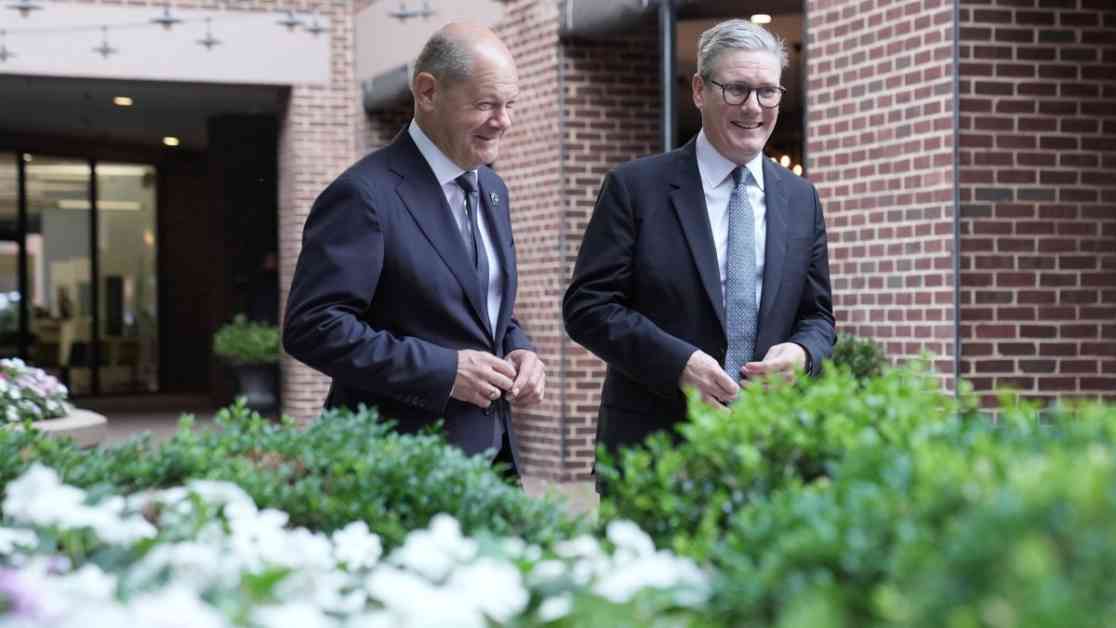Sir Keir Starmer, the Prime Minister of the United Kingdom, has initiated talks with Germany to soften Brexit through the negotiation of a new defence and trade pact. This move marks a significant step towards rebuilding relations with European partners and boosting the UK economy, which has been adversely affected by Brexit. The bilateral treaty, expected to take six months to negotiate, aims to strengthen ties between the UK and Germany in key areas such as market access, science, innovation, technology, clean energy, trade across the North Sea, supply chain resilience, energy security, and environmental sustainability.
Building Bridges with Europe
During his visit to Berlin, Sir Keir Starmer emphasized the importance of turning a corner on Brexit and repairing the broken relationships left behind by the previous government. He highlighted the opportunity to reset the UK’s relationship with Europe and strive for genuine, ambitious partnerships that deliver tangible benefits for the British people. The Prime Minister’s decision to prioritize talks with Germany reflects his commitment to moving beyond the divisive legacy of Brexit and fostering closer collaboration with European allies.
In his meeting with Chancellor Olaf Scholz, Sir Keir Starmer conveyed his vision of forging a new path for the UK by engaging in constructive dialogue with Germany and other EU countries. He emphasized the need for a comprehensive economic and defence pact that would lay the foundation for enhanced cooperation and mutual prosperity. By seeking to establish a treaty with Germany, one of the EU’s most influential members, the Prime Minister aims to demonstrate his commitment to building bridges with Europe and strengthening the UK’s position on the global stage.
Striving for Economic Growth
The UK-Germany treaty represents a bold attempt by Sir Keir Starmer to reset relations with Europe and chart a new course for the country’s economic future. By focusing on key areas such as market access, scientific cooperation, and environmental sustainability, the treaty aims to address critical issues that have been at the heart of Brexit negotiations with the EU. The Prime Minister’s proactive approach to engaging with Germany underscores his determination to revitalize the UK economy and establish stronger ties with European partners.
As part of his national mission to make the UK the fastest-growing economy in the G7, Sir Keir Starmer is seeking to leverage Germany’s economic prowess and strategic importance as Europe’s largest economy. By engaging with key industry leaders such as Siemens Energy and Rheinmetall, the Prime Minister aims to explore opportunities for collaboration in areas such as clean energy, technology, and defence. The UK’s partnership with Germany is crucial for driving economic growth and fostering innovation in sectors that are vital for the country’s future prosperity.
Promoting International Cooperation
The UK-Germany treaty is expected to pave the way for closer cooperation between the two countries on global issues such as the war in Ukraine and the Middle East. By aligning the E3 members – Britain, France, and Germany – in lockstep, the Prime Minister seeks to enhance collective efforts to address complex geopolitical challenges and promote stability in regions of strategic importance. The treaty with Germany is a significant step towards strengthening the UK’s position as a key player in international affairs and fostering closer ties with European partners.
In addition to economic and defence cooperation, Sir Keir Starmer’s discussions with Chancellor Scholz may also touch upon pressing issues such as growing tensions in the Middle East and the threat posed by the Far Right in both countries. As social democratic leaders, they share a commitment to promoting peace, security, and social cohesion in the face of extremist ideologies and geopolitical instability. By addressing these challenges together, the UK and Germany can demonstrate their shared values and commitment to upholding democratic principles and human rights.
The Prime Minister’s diplomatic blitz, which includes visits to Berlin and Paris, underscores his determination to strengthen relationships with key European allies and promote international cooperation on pressing global issues. By engaging with leaders in both countries and participating in high-profile events such as the Paralympics Opening Ceremony, Sir Keir Starmer is signaling his government’s commitment to building bridges with Europe and fostering a more inclusive and prosperous future for the UK and its European partners.
In conclusion, Sir Keir Starmer’s efforts to soften Brexit through talks with Germany reflect his government’s proactive approach to rebuilding relations with European partners and promoting economic growth and international cooperation. The UK-Germany treaty represents a significant step towards establishing a new framework for collaboration in key areas such as trade, defence, and environmental sustainability. By engaging with Germany and other EU countries, the Prime Minister is setting a positive tone for future negotiations and demonstrating his commitment to building a more resilient and prosperous future for the UK and its European allies.













